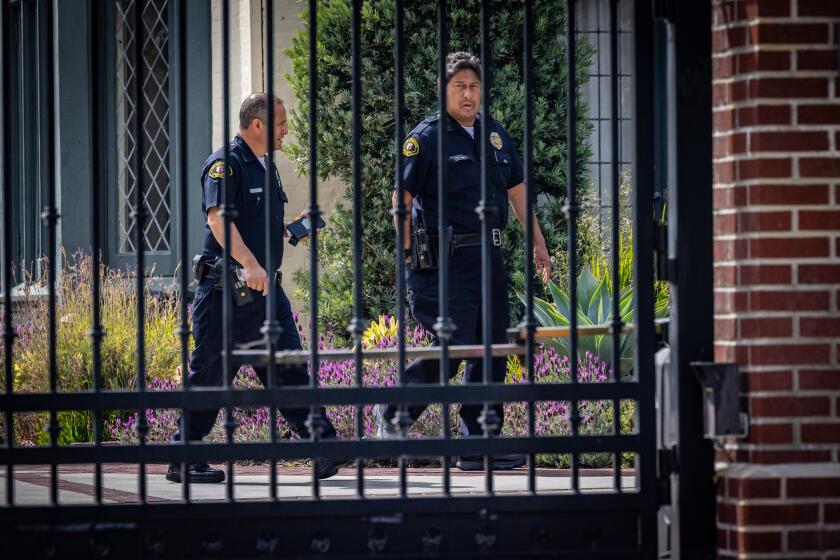Meth Measure Wouldn’t Burden Shoppers
A day after Riverside County supervisors voted to crack down on methamphetamine producers, county officials said the measure as passed would not include a provision to require people who buy certain cold medicines to provide personal information to store clerks.
County lawyers said the county lacked legal authority to enforce such a requirement because only the state can regulate drug sales. The lawyers said they had removed that provision from a county ordinance before it was tentatively approved by supervisors Tuesday.
Copies of the ordinance made available to the media and public before the meeting included the provision. It would have required retailers and pharmacists selling nonprescription cold medicines containing the drug pseudoephedrine or related compounds to keep a log of buyers’ names, addresses, phone numbers and driver’s license numbers. That version of the ordinance remained on the county website through Wednesday morning.
After Tuesday’s vote, the author of the ordinance, Supervisor Jeff Stone, said that under the measure he and his colleagues had approved, the ledgers of customers’ personal information “would have to be kept by the establishment” so police could monitor who was buying large quantities of ingredients used to make methamphetamine.
“It will allow us to track down those who are obviously buying for reasons other than illness,” Stone said.
On Wednesday, Stone said his comments on Tuesday night had been “theoretical” and that he had been aware of the changes made to the measure at the time he voted on it. The four other supervisors also said they had been informed of the amendments made to the ordinance before they voted. The supervisors conducted only a brief discussion of the measure before voting.
As amended, the ordinance would have no effect on shoppers or stores. It would only require convicted methamphetamine makers to pay for the cleanup of their hazardous labs and establish a county fund for rewards to tipsters who help with successful prosecution of meth producers.
Nevertheless, Riverside County’s action prompted new calls among drug store industry groups for uniform national legislation on sales of cold medicines that include ephedrine, pseudoephedrine and other ingredients that can be used to make methamphetamine.
“What we would like to have is one standardized approach to selling pseudoephedrine products,” said Mary Ann Wagner, vice president of pharmacy regulatory affairs for the National Assn. of Chain Drug Stores, based in northern Virginia. “It’s just getting to be a patchwork of various regulations.”
Several states already have systems for tracking purchases of the cold remedies. Missouri will require pharmacists to keep a log of customers buying them and make the logs available to law enforcement.
Legislation proposed by U.S. Sen. Dianne Feinstein (D-Calif.) and Jim Talent (R-Mo.) would establish a nationwide system requiring that all cold remedies containing pseudoephedrine be placed behind the counter. The legislation would also limit the amount customers could buy each month, require the buyers to provide their signatures and identification, and allow the U.S. Department of Justice to eventually create a database to track purchases nationwide.
Pfizer Inc., maker of such popular pseudoephedrine products as Sudafed and Pediasure, says it favors a national standard for controlling sales of the products. That has prompted Pfizer to offer a new, pseudoephedrine-free medication, with phenylephrine, released in February as Sudafed PE.
Officials with the California Grocers Assn. said any system for tracking cold remedy purchases could violate privacy.
“Does law enforcement have a right to know that [someone] has hay fever every spring and buys a lot of Sudafed for that? These are privacy concerns,” said Paul Smith, the group’s vice president for government relations. “That’s a huge 1st Amendment issue, and that’s a huge search-and-seizure issue.”
Major California grocers such as Albertsons, Ralphs and Vons already keep the products behind the counter, to prevent theft.
Smaller grocery stores and convenience shops, such as 7-Eleven, will probably drop the product, Smith said.
Stone said Wednesday that he still favored a ledger system to track sale of remedies used to make meth, though he had no plans to revive the provision.
“It’s unfortunate that 99% of pseudoephedrine purchasers are for legal usage and we have to regulate for such a small part of the population,” Stone said. “But the abuse potential and the profit potential is so pervasive that, if we are truly going to have an impact, we have to regulate somehow.”
The chairman of the Board of Supervisors, Marion Ashley, agreed. “When the existing law isn’t working, you’ve got to get it tougher.... I don’t think we’re encroaching much on people’s civil liberties to keep people from selling drugs to kids.”
Supervisor Roy Wilson said Wednesday that he was reserving judgment on the matter. Supervisors Bob Buster and John F. Tavaglione said they had misgivings about maintaining extensive personal databases.
“It’s going to create more problems than it prevents,” Buster said, citing the record-keeping burden on stores and law enforcement.
Tavaglione was skeptical that a ledger would deter drug makers.
“A meth manufacturer, if they’re intent on breaking the law, they’re going to find a way to break the law,” he said. He favors stiffer penalties for meth producers.
More to Read
Start your day right
Sign up for Essential California for news, features and recommendations from the L.A. Times and beyond in your inbox six days a week.
You may occasionally receive promotional content from the Los Angeles Times.






